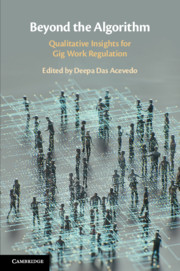Book contents
- Beyond the Algorithm
- Beyond the Algorithm
- Copyright page
- Contents
- Figures
- Tables
- Foreword
- Acknowledgments
- Introduction
- 1 The Rise and Scope of Gig Work Regulation
- 2 An Uber Ambivalence
- 3 Invisible Work, Visible Workers
- 4 The Importance of Qualitative Research Approaches to Gig Economy Taxation
- 5 Just a Gig?
- 6 Algorithmic Management, Employment, and the Self in Gig Work
- 7 Regulating Transportation Systems without Authority (or Data)
- 8 Words Matter
- 9 Rewriting the Rules
- 10 What Regulators Could Gain by Listening to Rideshare Drivers
- Index
6 - Algorithmic Management, Employment, and the Self in Gig Work
Published online by Cambridge University Press: 22 October 2020
- Beyond the Algorithm
- Beyond the Algorithm
- Copyright page
- Contents
- Figures
- Tables
- Foreword
- Acknowledgments
- Introduction
- 1 The Rise and Scope of Gig Work Regulation
- 2 An Uber Ambivalence
- 3 Invisible Work, Visible Workers
- 4 The Importance of Qualitative Research Approaches to Gig Economy Taxation
- 5 Just a Gig?
- 6 Algorithmic Management, Employment, and the Self in Gig Work
- 7 Regulating Transportation Systems without Authority (or Data)
- 8 Words Matter
- 9 Rewriting the Rules
- 10 What Regulators Could Gain by Listening to Rideshare Drivers
- Index
Summary
This chapter argues that the partial automation of managerial authority should not matter when determining whether platform workers are—or should be treated as—employees or independent contractors under the law. It offers a close reading of an end-user license agreement (EULA) between the on-demand transportation company Uber and its drivers. In particular, the chapter examines the relationship between the EULA and Uber’s use of algorithmic management to design, direct, monitor, evaluate, and compensate drivers’ work. By scrutinizing this relationship through a theory of the “self” implicit in contract law, the chapter shows that the EULA grants Uber rights to direct drivers’ work and determine the principal terms of the agreement as it goes along. This unilateral discretion is difficult to reconcile with what the law expects of an enforceable contract. Rather, it resembles the open-ended authority that the law permits an employer over its employees. Uber exercises its extra-contractual discretion through the App. Algorithmic management enables Uber continually to recalibrate its putative bargain with drivers to the company’s advantage. One lesson of this analysis is that decision makers tasked with evaluating the employment status of platform workers should take more seriously the contractual component of being an “independent contractor.”
Keywords
- Type
- Chapter
- Information
- Beyond the AlgorithmQualitative Insights for Gig Work Regulation, pp. 123 - 145Publisher: Cambridge University PressPrint publication year: 2020
- 1
- Cited by

